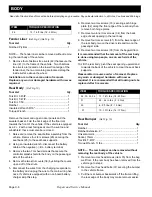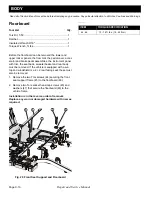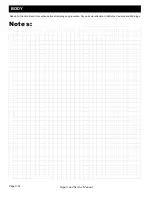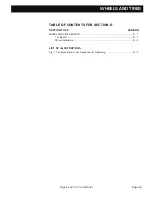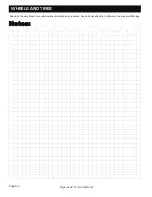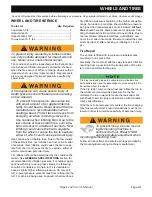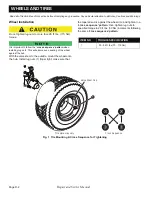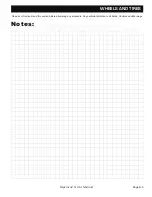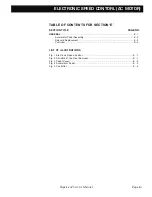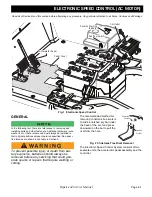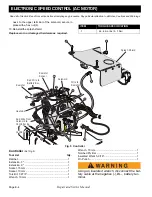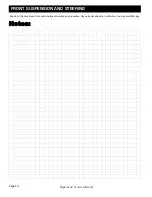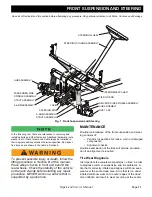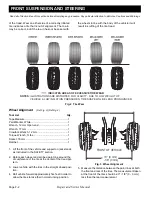
WHEELS AND TIRES
Page D-1
Repair and Service Manual
Read all of Section B and this section before attempting any procedure. Pay particular attention to all Notes, Cautions and Warnings.
B
B
WHEEL AND TIRE SERVICE
Tools List
Qty. Required
Lug wrench, 3/4" ......................................................... 1
Impact wrench ............................................................. 1
Impact socket, 3/4"...................................................... 1
Torque wrench, ft. lbs. ................................................. 1
To prevent injury caused by a broken socket,
use only sockets designed for impact wrench
use. Never use a conventional socket.
Tire condition should be inspected per the Periodic Ser-
vice Schedule. Inflation pressures should be checked
when the tires are cool. When removing wheels with an
impact wrench, use only impact sockets. Regular sock-
ets are not designed for impact pressures exerted by
power tools.
A tire explosion can cause severe injury or
death. Never exceed inflation pressure rating
on tire sidewall.
To prevent tire explosion, pressurize tire
with small amount of air applied intermit-
tently to seat beads. Never exceed the tire
manufacturer’s recommendation when
seating a bead. Protect face and eyes from
escaping air when removing valve core.
Use caution when inflating tires. Due to the
low volume of these small tires, over infla-
tion can occur in a matter of seconds. Over
inflating could cause the tire to separate
from the wheel or cause the tire to explode,
either of which could cause personal injury.
Use caution when inflating tires. Due to the low volume
of these small tires, over inflation can occur in a matter
of seconds. Over inflation could cause the tire to sepa-
rate from the rim or cause the tire to explode, either of
which could cause personal injury.
Tire inflation should be determined by the condition the
terrain. See
GENERAL SPECIFICATIONS
section for
recommended tire inflation pressure. For outdoor appli-
cations with major use on grassy areas, the following
should be considered. On hard turf, it is desirable to
have a slightly higher inflation pressure. On very soft
turf, a lower pressure prevents tires from cutting into the
turf. For vehicles being used on paved or hard surfaces,
tire inflation pressure should be in the higher allowable
range, but under no condition should inflation pressure
be higher than recommended on tire sidewall.
All four
tires
should have the same pressure for optimum han-
dling characteristics. Be careful not to overinflate. Due to
the low volume of these small tires, overinflation can
occur in a matter of seconds. Be sure to install the valve
dust cap (item 2) after checking or inflating to 18 - 22
psi.
Tire Repair
The vehicle is fitted with low pressure tubeless tires
mounted on one piece rims.
Generally, the most cost effective way to repair a flat tire
resulting from a puncture in the tread portion of the tire
is to use a commercial tire plug.
Tire plug tools and plugs are available at most automotive
parts outlets and have the advantage of not requiring the tire
be removed from the wheel.
If the tire is flat, remove the wheel and inflate the tire to
the maximum recommended pressure for the tire.
Immerse the tire in water to locate the leak and mark
with chalk. Insert tire plug in accordance with manufac-
turer’s specifications.
If the tire is to be removed or mounted, the tire changing
machine manufacturer’s recommendations must be fol-
lowed in order to minimize possibility of personal injury.
To prevent injury, be sure mount-
ing/demounting machine is
anchored to floor. Wear OSHA
approved safety equipment when
mounting/demounting tires.
Follow all instructions and safety warnings provided by
the mounting/demounting machine manufacturer.




